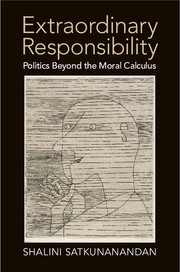Extraordinary Responsibility: Shalini Satkunanandan
Quick Summary
- Does “being responsible” simply mean fulfilling our duties, or paying what we owe? In her first book, Assistant Professor of Political Science Shalini Satkunanandan explores the history of calculative thinking in ethics and politics—a history with profoun
Imagine a traveler opting to offset the carbon footprint of her journey when buying an airplane ticket. At first glance, this appears to be a straightforward case of responsibility discharged. But in Extraordinary Responsibility: Politics Beyond the Moral Calculus (published in 2015 by Cambridge University Press), Dr. Shalini

Satkunanandan argues that when we allow ourselves to be seduced by such calculations—seduced, that is, into believing they represent the whole of our responsibility—problems arise.
Our carbon-offsetting traveler may board her flight comforted by her “zero carbon footprint,” and thus ignore other implications of the trip: the environmental impacts of the air travel industry, say, or our society’s dependence on fossil fuel. This kind of cognitive short-circuit, Satkunanandan suggests, affects us on a much greater scale, and for much longer, than we may realize.
Morality versus moralism
Satkunanandan has an abiding interest in the relationship—and distinction—between morality and ethics. The former can be broadly defined as a rule-bound orientation to responsibility, while the latter describes the sphere of responsibility broadly construed. Her book reveals a particular concern with the phenomenon of morality’s degeneration to moralism, described as a “simplifying, inflexible approach to responsibility, which may in fact be petty or punitive, and which places too much emphasis on rules (including pre-assigned roles and social scripts) and the monitoring of our own and others’ compliance with these rules.”

Through chapters devoted to Nietzsche, Heidegger, Plato, Kant and Weber, Satkunanandan identifies a surprising similarity in these thinkers’ understandings of moralism and its causes. All approach moralism not merely as a problem of overly rigid adherence to rules, but as linked to the extension of calculative ways of understanding responsibility and the world.
The book provides a historical examination of “calculable responsibility,” exploring its presence in human thought as a peril recognized by thinkers at least since Plato. Calculable responsibility refers to our common tendency to view our responsibility as a series of debts that can be identified in advance, reckoned up, negotiated, balanced out and discharged. Satkunanandan brings into focus the persistence of calculation as a reductive force that threatens full responsibility across many eras, while shedding light on contemporary manifestations.
Debt crisis
Her approach exposes some of the ways in which calculation, linked with moralism, naturalizes some expectations such that we may not give them further thought. For instance, Satkunanandan explores and elaborates Nietzsche’s claim that a focus on repayment of debts is a historical, contingent development, actually constitutive (in his argument) of a moral way of seeing the world.

Without dismissing the merit of calculation as one way to think about justice, Satkunanandan argues here that an exclusive focus on the discharge of debts causes us to look only for calculable debts, and calculable repayments. But does repayment of a calculable debt represent or exhaust responsibility in every case? (One need only contemplate the U.S. student or Eurozone debt crises to see how this assumption could be problematic.)
“It is all too easy to let the moral force of the idea that all debts must be discharged trump all other considerations and discourage further exploration of the situation at hand,” Satkunanandan notes. “We let the self-evident immorality of debt substitute for our thoughtful response to the details of the situation.” She cautions against the temptation to allow the moral transgression to exact an automatic demand on us.
Start with duty
If the overreach of calculative thinking poses such dangers, how do we keep it at bay in political life? Here is where things can become tricky, since merely observing the existence of “incalculable” costs can sometimes enable us to dismiss them. In her concluding chapter, Satkunanandan presents as an example the case of President Obama’s speech justifying drone strikes. Eschewing the prior administration’s broad-strokes “war on terror” rhetoric as representing a difficult-to-bound unleashing of indiscriminate violence, Obama proposed a contrasting strategy of specific attacks with particular targets.

By recognizing the complexity and scale of terrorism, Satkunanandan notes, Obama appeared to acknowledge the existence of incalculables, and present discrete, targeted drone attacks as the most responsible option. However, in making the incalculable justify the apparently calculable, Obama obscured the “messiness” and hidden incalculables of the supposedly “neat” and “contained” drone strategy—a strategy which in fact relies on  dubious methods of calculation surrounding the identification of “combatants” in an area. As Satkunanandan writes, “Killing is never neat.”
dubious methods of calculation surrounding the identification of “combatants” in an area. As Satkunanandan writes, “Killing is never neat.”
What is needed, she argues, is continual attentiveness to calculative tendencies, and to their treatment as a jumping off point for considering whether an apparent moral duty in a given situation goes far enough. Thus Satkunanandan states, “One way of attending to calculable responsibility is to consider every duty we think we must discharge and consider what dimensions of responsibility the promise of discharge actually effaces.” Duty may be a good place to start, rather than to end: “I am suggesting that we attend to the language of moral rules precisely as way of making sure that moral rules don’t prematurely exhaust our responsibility.”
Calculating the calculable
In our interview, Satkunanandan identifies a contemporary case in which the implications of calculative thinking must be carefully watched. This is the Supreme Court’s developing position that “accounting for costs” is a necessary component in the Environmental Protection Agency’s regulatory activities. The trouble (as has become clear from ensuing debates between polluters and public health groups) is that not all types of pollution impact are equally measurable or weighable against economic costs. Some of the most egregious forms of harm to health —such as life-long impacts of childhood mercury exposure—resist neat tabulation.
“Around such debates we need to pay attention to the way that our assumption that responsibility is calculable may give more authority to cost-benefit analysis than it perhaps should have, and may allow cost-benefit analysis (in areas where it is difficult to quantify costs and benefits) to work to limit responsibility rather than to reveal the extent of our responsibility.”
Satkunanandan’s call is not for the complete eradication of calculation from our thinking about responsibility—which would, in any case, be impossible—but for a keener and more consistent awareness of its limitations. “I am not saying that cost-benefit analysis is always an improper way to assess the appropriateness of a particular regulation, but I am suggesting it should not always be necessary to our understanding of what is appropriate.”
True tolerance

Recently, Satkunanandan has begun work on a new project, tentatively entitled Religious Observance: The Politics of Academic Faiths. In it, she investigates contemporary  attempts, in academia and beyond, to re-imagine religion in ways that are consistent with modern understandings of truth and the intellect. This academized understanding is of particular relevance and interest, Satkunanandan proposes, for the way it has colonized states’ regulatory treatment of religions, and become a way that religion is incorporated in politics in liberal societies.
attempts, in academia and beyond, to re-imagine religion in ways that are consistent with modern understandings of truth and the intellect. This academized understanding is of particular relevance and interest, Satkunanandan proposes, for the way it has colonized states’ regulatory treatment of religions, and become a way that religion is incorporated in politics in liberal societies.
But what happens when actual religions fail to measure up to these academic templates? Satkunanandan is interested in the light this process may shed upon the limits of what is truly tolerable within the “tolerant” polity of late liberalism.
Learn more about Shalini Satkunanandan and her work at her faculty webpage.